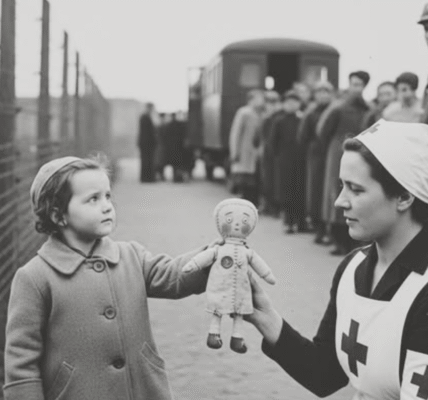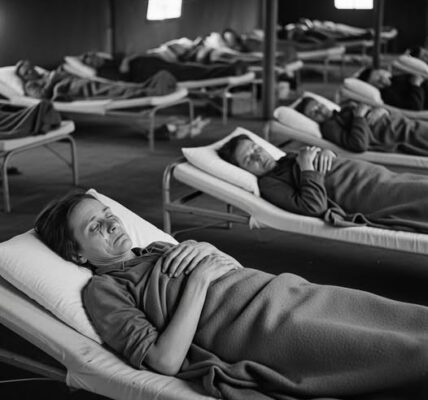The Woman Who Sang in the Dark – Ravensbrück, 1944

There are stories that never die, even when born in the deepest darkness. The one I’m about to tell was born in the heart of Ravensbrück, a German concentration camp almost exclusively for women. It was 1944, a time when World War II was entering its harshest phase, when Europe was sinking under Nazi tyranny, when the Holocaust was claiming millions of lives. There, behind barbed wire, in icy barracks steeped in suffering, a fragile voice occasionally rose, like an unexpected spark: the voice of a woman singing in the darkness.
Ravensbrück was no ordinary camp. It was a dehumanization machine, a place designed to break bodies as well as souls. Tens of thousands of Jewish women, resistance fighters, Roma, political opponents, and simply those deemed undesirable by Nazi ideology were crammed there. Their clothes, hair, and names were stolen. They were assigned numbers, and humiliation became their only identity. In this atmosphere permeated with fear and despair, finding a modicum of solace was practically impossible. Yet each night, as the SS guards’ shouts and the final round of kapos descended upon the barracks, a heavy silence descended upon the wooden beds, an almost inaudible melody echoed between the wooden beds.
It came from a woman whose name has not survived in the archives. She was known only as “she who sang.” Her face was gaunt, her eyes sunken with hunger, but her lips still had the power to evoke memories. Her voice was not that of a singer, but that of a survivor. She hummed old lullabies she had learned long ago, in the innocence of childhood. Her classmates, lying side by side, their aching bones resting against the wood, listened in silence. Some closed their eyes, others let their tears fall. In the darkness, they said her voice was “a candle in the dark.”
This song wasn’t a simple whisper. It was resistance. In Ravensbrück concentration camp, where hunger, disease, and beatings had stripped away all will, every note this woman sang became an act of defiance. The Nazis took everything: emaciated bodies, shaved hair, torn families, desecrated memories. But that voice, soft and fragile, eluded them. It reminded women that they were not just numbers on a register, but human beings capable of remembering joy, capable of still loving, capable of imagining a world beyond barbed wire.
Testimonies from Ravensbrück tell of the unbearable nature of daily life there. Women rose at dawn, regardless of the weather, for endless roll call, which sometimes lasted for hours in snow or freezing rain. They worked to the limits of their endurance, in armaments factories or on construction sites, under whips and abuse. Hunger consumed every moment: scanty soup, a crust of stale bread, sometimes nothing at all. Diseases were rampant: dysentery, typhus. And there was always the fear of selection, where some were sent to immediate death. In this desolate environment, the woman who sang in the dark had nothing more than others. She was just as hungry, just as exhausted. But she still possessed a treasure: the memory of childhood songs.

These lullabies spoke of lost worlds, warm homes, caring arms, peaceful evenings before the war. Through humming, she connected these memories. Every woman could grasp an image, a sensation: a mother’s smile, a hand on a child’s forehead, a flame in the fireplace. It was a weapon against forgetting, against the denial of humanity that Nazism sought to impose.
One evening, a prisoner recounted that when she was at her wit’s end, she heard this song like a breath of life. She said to herself, “If she’s still singing, it’s because we’re not dead yet.” In this way, the stranger’s voice became a beacon of resistance, a form of secular prayer, proof that the spirit can break free from oppression.
But Ravensbrück stories rarely end in victory. In 1944, the hunger became more brutal, the executions more frequent. Women were exploited in cruel medical experiments. The singer, like so many others, eventually died. One night, her voice faded. Her bed remained empty. Yet something endured. The women who shared the barracks with her, unable to reconcile themselves to the silence, began to hum. They took up her melodies, at first clumsily, then with renewed intensity. It was their way of saying goodbye, of prolonging her breathing.
After his death, the others continued to hum the lullaby. And this song, passed down from mouth to mouth, echoed through the camp walls, resonating in memory long after those who heard it had disappeared. And so it returns to us today, like a faint echo from the depths of the Holocaust.
Ravensbrück was liberated in April 1945 by the Red Army. Of the approximately 130,000 women who passed through the camp, approximately 90,000 perished. The memory of their suffering is now embedded in the history of the Holocaust, alongside more notorious camps such as Auschwitz and Bergen-Belsen. However, stories like that of the singing woman remind us that resistance is not measured solely by weapons or spectacular feats. Sometimes it lies in the fragility of a voice that refuses to be silenced.
Singing in the dark was an affirmation of dignity. A protest against oblivion. The Nazis sought to erase individuals, to relegate them to the shadows. Yet this woman left a mark stronger than any statistics. There is no known grave or monument commemorating her name, yet she lives on in collective memory thanks to those notes that pierced the darkness.
Today, as we strive to convey the story of the Holocaust to new generations, the image of that fragile voice resonates as a universal lesson. It reminds us that even in the worst prisons in history, humanity can still be reborn. That dignity survives hunger, cold, and violence. That a simple song can become an act of freedom.
In Ravensbrück, in 1944, a woman sang in the darkness. She didn’t want to be a hero. She only wanted to bring a little warmth to those trembling around her. But she unwittingly gave humanity resounding proof: even at the depths of the abyss, the spirit can resist, and a voice can become louder than the silence of death.
His song still resonates whenever we remember it.




